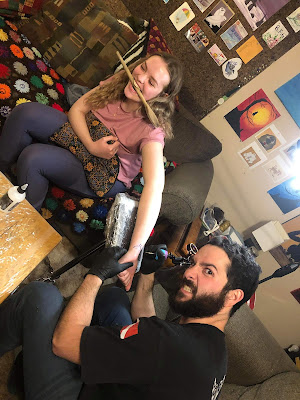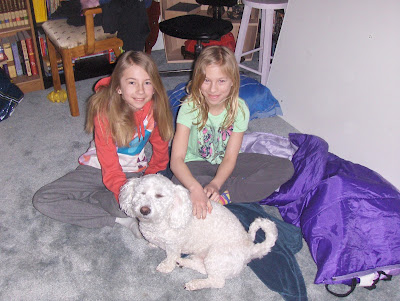My church became what's called an Affirming Ministry back in 2014, meaning we had completed a course of education and dialogue together and then voted on our commitment to joining a national body (Affirm United) in working for the inclusion of people of all gender identities and sexual orientations in the United Church of Canada and in society. We had a party that fall to commemorate the occasion, and every year at that time, on our Affirmiversary, our Affirm Team volunteers to lead the service.
It is a privilege to be able to do the sermon for such an occasion, even if it is a bit daunting to do so with both of our ministers in the audience (gulp!). As a team we talked about themes and ideas we wanted to address, and we ended up settling on oppression, as well as ways to overcome it.
I had only the barest outlines for this when we learned Nitti would need to be put down, and it was very hard to get back to it after that. It didn't come together quite as cohesively as I had hoped, but I think the message came through strongly regardless. I put the readings at the end of this post for those who are curious.
- - - - - - - - - - - - - - - - - - - - - - - - - - - - - - - - - -
I mean, my household got off kind of easy in most ways. I’m still working, only from home, Audrey is still needed to help in her school, for however long that lasts, Fenya is taking her university classes online, and Glory is working in Churchill, where they are just starting to put measures in place that we’ve had "down south here" for a while now, like public masking.
But it has been bad, right? Here in Alberta, there have been nearly 20,000 cases and over 250 deaths. People have their household incomes diminish or even vanish, and nearly everyone is feeling the strain of restrictions on our lives that we hadn’t even imagined a year ago. We can’t do what we like, see who we want, eat in most restaurants or enter many spaces outside our homes without a mask. I mean, I do it, and I do so without hesitancy so others can be safe, but I still hate it.
You could almost describe it as oppressive, couldn’t you?
Is it possible that this horrible, destructive and pervasive virus has given many of us our first, small taste of oppression? To have our livelihoods impacted or removed entirely, as if by a whim? To have our movements, gatherings and other actions restricted? Do we perhaps have a marginally better understanding of the coercive loneliness of the abandoned senior? Or of the dominance that many minorities, both racial and sexual, live under everyday?
If nothing else, has COVID-19 been an effective reminder of the privilege many of us enjoy in our everyday lives? And perhaps a bit of empathy for those who don’t?
Oppression is still a real thing in our world, sadly, and it certainly applies to our siblings in the LGBTQ+ community. In the six years since we have become an Affirming Ministry, we have done a lot of education and I think a lot of us have come a long way in understanding how it feels to walk in those shoes, but bet there are still some who will hear this, or read it, and think “well, come on now - that is hardly a community that is oppressed.”
Just because no one is making queer people wear armbands with pink triangles on them or because there are finally legislative protections in place for many of them doesn’t mean they are not oppressed. Consider:
- Bi-sexual and trans people are over-represented among low-income Canadians
- There are higher rates of depression, anxiety, obsessive-compulsive and phobic disorders, suicidality, self-harm and substance abuse among LGBTQ+ people
- They are at double the risk for post-traumatic stress disorder than heterosexual people
- LGBTQ+ youth face approximately 14 times the risk of suicde and substance abuse than heterosexual peers.
- 7% of trans respondents in an Ontario-based survey had seriously considered suicide and 45% had attempted suicide
He was really upset. Up early and unable to get back to sleep, he was checking Facebook on his phone and had come across a post about his former church appointing a lesbian woman to a position of some authority. But there was a reply from a former pastor he knew personally, and who he thought was someone trustworthy and understanding, listing his opposition to it and saying the scriptures are clear on this [they aren’t], and that he “fears for the future.”
With no place he felt he could go to in town and unable to stay put, Mark came to my house, hoping I could put him in touch with someone from an affirming ministry. Rev. Deborah was able to call him for a chat that afternoon, and I am so, so grateful she could address some of his concerns. The root problem remains, though: there are forces in the world that want to make the different among us feel like they are somehow lesser folk.
So let’s agree on a couple of foundational points: oppression is bad, sexual minorities (among others) are subject to it, and maybe some of us have a marginally clearer idea of what oppression feels like now than we did perhaps last year at this time. Where do we go from here?
Kamand Kojouri’s poem paints a powerful picture of silence overcoming noise, not a quiet and acquiescing silence - this is important - but a loud one, appealing for acknowledgement, demanding to be heard. It is a silence louder than the jeering shouts or fearful chants of the oppressors and their ilk. But it’s tough! Intuitively, when we hear hate, when we hear lies, we want to shout back, drown out the deception, the distortion, the deceit with the truth, and I think there is still a place for that, but there is also value in establishing silence first, to create a space in which the truth can be heard.
The reading from Ephesians about the “Armour of God” is often co-opted by readers wanting to focus on spiritual warfare against otherworldly creatures and their influence, even going so far as to call them out as “spiritual forces of evil in the heavenly realms.” But here in the temporal realm that we live in day-to-day, it lists the tools needed to triumph over the rulers and authorities, those who would maintain the status quo and those who fight to preserve a state of injustice.
“The belt of truth buckled around your waist, with the breastplate of righteousness in place, and with your feet fitted with the readiness that comes from the gospel of peace.”
I am not even close to being a biblical scholar or theologian, but as a person trying to follow the example that Jesus set and someone hoping to make God’s world a better place, truth, righteousness, readiness and faith sure look to me like a recipe for the end of oppression.
And then, in our reading from Matthew, Jesus again underscores the behaviours that we need to display in order to be numbered among the righteous: to give food to the hungry, drink to the thirsty, clothing to the naked, visits to the imprisoned and welcome to the stranger.
I changed the order a bit, because I think that last one is really crucial to remember today, on our Affirmiversary. To be actively, affirmingly welcoming, to a community that has not always been treated well by Christianity in general, and at times, by our own denomination.
But the words of Jesus also remind us of the allure of the status quo,the inherent human resistance to disruption and the fact that if no one changes their mind, nothing really changes. As is perhaps typical for the New Testament, the way forward is not necessarily to defeat or destroy the oppressors, but to change their minds - to shift them from being oppressors to being supporters.
Frankly, a straight-up fight might be easier, and it would almost certainly be more cathartic… but we understand in our hearts, it would never end.
Kamand’s poem ends this way: “My silence speaks.” It is not an encouragement to remain silent in the face of oppression, but to use silence to call it out, quietly affirming what is right. Letting people know that transphobic language is hurtful, that homophobic slurs are not to be tolerated, that laws impinging upon the rights of LGBTQ+ people are not fair and must be changed.
And it won’t be easy, because some people benefit from injustice, some people draw a false sense of safety from oppression, and others simply have little to no empathy and just don’t care.
But we won’t stop. We will keep pushing an agenda of fairness and inclusion for everybody until we get to a point where we can’t imagine it another way, where injustices immediately prompt a wider silence - followed by action.
The South African anti-apartheid activist Steven Biko once said “The revolutionary sees his task as liberation not only of the oppressed but also of the oppressor. Happiness can never truly exist in a state of tension.”
And happiness should be the goal of all ministries, not just affirming ones, and I don’t mean to be a bummer on this, our sixth Affirmiversary.
Let’s be grateful for the headway we have made!
Let’s be grateful for the leaders and educators we have who are helping us to get there, like Rev. Mervin and Rev. Deborah, and our friend Shylo from Robertson-Wesley!
Let’s be grateful for our Affirming Team, who puts this service together every year and gets us amped up for Pride!
And most of all, let us be grateful to each other, the people of St,. Albert United Church, proud to be a welcoming, loving and Affirming community of faith for six years now!
The fight against oppression may never truly be won, but God has given us the tools - truth, righteousness, readiness and faith - and Jesus has shown us the way. The best is yet to come!
Amen
- - - - - - - - - - - - - - - - - - - - - - - - - - - - - - - - - - - -
Our Affirmiversary should always have a certain degree of focus on the LGBTQ+ community, but I do wish I had taken some time to call out the Black Lives Matter movement and other similar initiatives around the world focusing on freedom from oppression. On the whole, though, I felt pretty good about it, and it seemed to be well received. One fellow, an RCAF vet I chum around with a fair bit at church, told me he appreciates my messages because he can tell they come from the heart, so I guess if I stick with that, I will continue to make out all right.
(A video for the entire service can be found here, and you can jump to my reflection at 29:32 here.)
READINGS
Ephesians 6:10-17 (NRSV)
The Armor of God
Finally, be strong in the Lord and in his mighty power. Put on the full armor of God, so that you can take your stand against the devil’s schemes. For our struggle is not against flesh and blood, but against the rulers, against the authorities, against the powers of this dark world and against the spiritual forces of evil in the heavenly realms.
Matthew 25:41-46 (NRSV)
A Poem by Kamand Kojouri
as pregnant mothers grow with life.
Let my silence permeate these walls
as sunlight permeates a home.
Let the silence rise from unwatered graves
and craters left by bombs.
Let the silence rise from empty bellies
and surge from broken hearts.
The silence of the hidden and forgotten.
The silence of the abused and tortured.
The silence of the persecuted and imprisoned.
The silence of the hanged and massacred.
Loud as all the sounds can be,
let my silence be loud
so the hungry may eat my words
and the poor may wear my words.
Loud as all the sounds can be,
let my silence be loud
so I may resurrect the dead
and give voice to the oppressed.
My silence speaks.”



















































